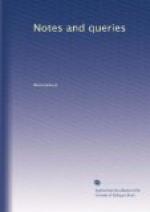The expression “a Flemish account” is probably not of very long standing, as it is not found in the most celebrated of our earlier dramatists, unless, indeed, Mrs. Page’s remark on Falstaff’s letter may be cited as an illustration:—“What an unweighed behaviour hath this Flemish drunkard picked out of my conversation, that he dares in this manner assay me.”
If the habit of drinking to excess prevailed in the Low Countries in the sixteenth century to the extent represented, may not the expression have arisen from that circumstance, and been equivalent to the contempt which is usually entertained for the loose or imperfect statements made by a tipsy or drunken man?
When quoting opinions upon Burnet, we must not forget the brief but pregnant character which Burke has given of the Bishop’s History of his Own Times. In his admirable speech at Bristol, previous to the election if 1780, Burke says, “Look into the History of Bishop Burnet; he is a witness without exception.”
Dr. Johnson was not so laudatory:—“Burnet is very entertaining. The style, indeed, is mere chit-chat. I do not believe that he intentionally lied; but he was so much prejudiced, that he took no pains to find out the truth.”
The reader may refer to Dr. Hickes’s Criticism (Atterbury’s Correspondence, i. 492.). Calamy’s expression is a significant, if not a very complimentary one, as regards Burnet’s candour (Life and Times, i. 59.).
I.H.M.
Bath, Dec. 1849.
Viz., why the contracted form of Videlicet.
I shall be much obliged if any one of your readers can inform me of the principle of the contraction viz. for videlicet, the letter z not being at all a component part of the three final syllables in the full world.
[Cross symbol]
[Is not our correspondent a little mistaken in supposing that the last letter in “viz.” as originally a letter z? Was it not one of the arbitrary marks of contraction used by the scribes of the middle ages, and being in form something like a “z,” came to be represented by the early printers by that letter? In short, the sign3 was a common abbreviation in records for terminations, as omnib3 for omnib_us_, hab3 for hab_et_. Vi3, corruptly viz. is still in use.]
Authors of Old Plays.
We are enabled by the courtesy of several correspondents, to answer two of the Queries of Q.D., in No. 5. p. 77., respecting the authors of certain old plays.
G.H.B. informs us that Sicily and Naples was written by Samuel Harding; of whom, as we learn from J.F.M., an account will be found in Wood’s Athenae.
NASO informs Q.D. that Nero was written by Matthew Gwinne; there are two editions of it, viz. 1603 and 1633,—and that a copy of it may be procured at 17. Wellington Street, Strand, for 2_s_.




